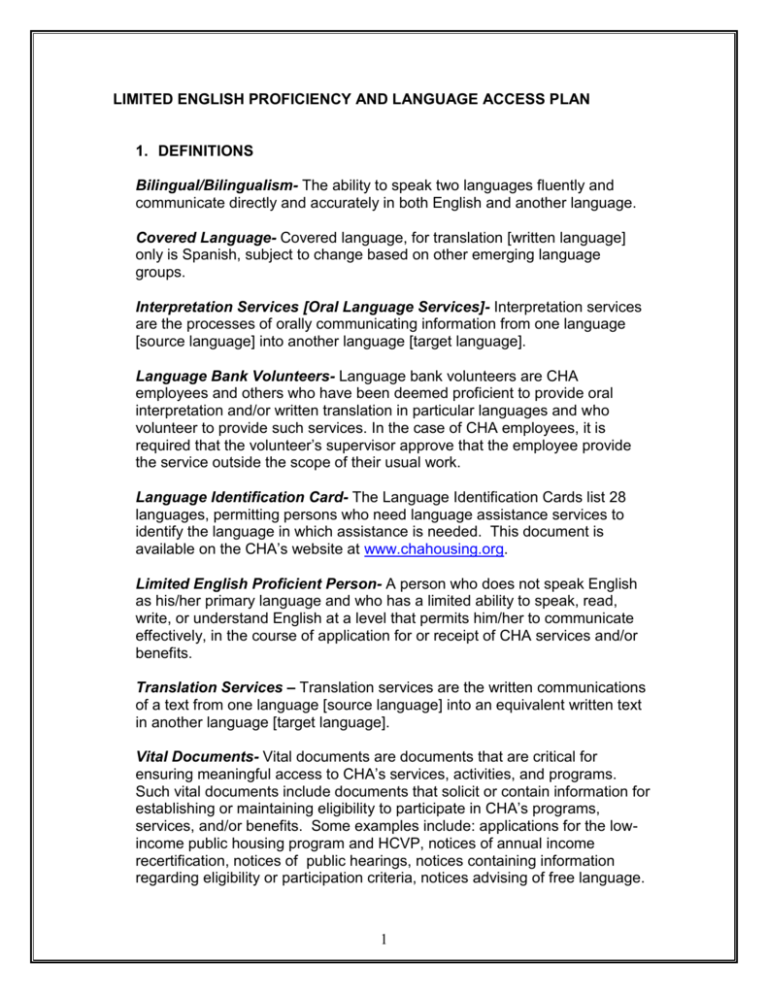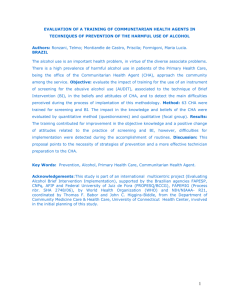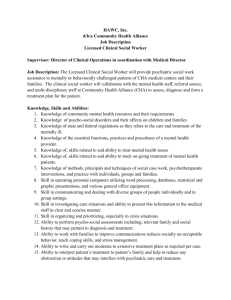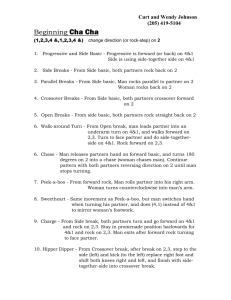limited english proficiency and language access plan
advertisement

LIMITED ENGLISH PROFICIENCY AND LANGUAGE ACCESS PLAN 1. DEFINITIONS Bilingual/Bilingualism- The ability to speak two languages fluently and communicate directly and accurately in both English and another language. Covered Language- Covered language, for translation [written language] only is Spanish, subject to change based on other emerging language groups. Interpretation Services [Oral Language Services]- Interpretation services are the processes of orally communicating information from one language [source language] into another language [target language]. Language Bank Volunteers- Language bank volunteers are CHA employees and others who have been deemed proficient to provide oral interpretation and/or written translation in particular languages and who volunteer to provide such services. In the case of CHA employees, it is required that the volunteer’s supervisor approve that the employee provide the service outside the scope of their usual work. Language Identification Card- The Language Identification Cards list 28 languages, permitting persons who need language assistance services to identify the language in which assistance is needed. This document is available on the CHA’s website at www.chahousing.org. Limited English Proficient Person- A person who does not speak English as his/her primary language and who has a limited ability to speak, read, write, or understand English at a level that permits him/her to communicate effectively, in the course of application for or receipt of CHA services and/or benefits. Translation Services – Translation services are the written communications of a text from one language [source language] into an equivalent written text in another language [target language]. Vital Documents- Vital documents are documents that are critical for ensuring meaningful access to CHA’s services, activities, and programs. Such vital documents include documents that solicit or contain information for establishing or maintaining eligibility to participate in CHA’s programs, services, and/or benefits. Some examples include: applications for the lowincome public housing program and HCVP, notices of annual income recertification, notices of public hearings, notices containing information regarding eligibility or participation criteria, notices advising of free language. 1 Additionally vital documents include documents that create or define legally enforceable rights or responsibilities. Some examples include: leases, notices to quit, notices of rights, denial, loss or reduction of benefits and hearing notices. 2. POLICY It is the policy of the Chattanooga Housing Authority [“CHA”] to take reasonable steps to ensure that people with Limited English Proficiency [“LEP”] have meaningful access to the CHA’s programs, services and activities. This policy complies with the Department of Housing and Urban Development’s [“HUD”] “Final Guidance to Federal Financial Assistance Recipients Regard Title VI Prohibition Against Nation Origin Discrimination Affecting Limited English Proficiency Persons” dated January 22, 2007. The CHA hereby designates the Director of Resident Services as its Language Access Coordinator [“LAC”] to assess annually the language assistance needs of the CHA and to monitor the CHA’s delivery of language assistance services in conjunction with CHA departments that provide programs or services to residents, applicants and voucher holders participating in the Housing Choice Voucher Program [“HCVP”]. The LAC shall recommend modifications to this LEP Policy and Language Access Plan [“LAP”] regarding the CHA’s delivery of language assistance services to LEP persons. 3. APPLICABILITY This policy applies to departments that provide services or programs to CHA applicants, residents and HCVP voucher holders. 4. ASSESSMENT OF LANGUAGE NEEDS – FOUR FACTOR ANALYSIS All CHA departments providing programs or services to CHA customers shall conduct periodic evaluations of the service tools being provided to LEP applicants, residents and HCVP voucher holders to determine if there are new and/or different needs. The CHA shall use the U.S. Department of Justice’s “Four Factor Analysis” found at www.justice.gov/crt/lep/selfassesstool.htm and any amendments thereto, in the determination of the CHA’s language assistance services needs. Factor 1: Determine the number or percentage of LEP persons eligible to be served or likely to be served by the CHA programs, by using one or more of the following: 2 Provide questions on an initial application or enrollment form to determine if the applicant needs language services; Identify language utilizing Language Identification Card, if available, and record language of applicant, residents or voucher holder at points of contact and service. Factor 2: Each CHA Department shall track and record requests for language assistance, service provided [interview, hearing, briefing, etc] and who provided language services [e.g. bilingual employee, Language Bank Volunteer, contract vendor, other] Factor 3: Determine the nature and importance of the CHA’s programs and activities by recognizing which CHA activities may require an interpreter to assist an LEP person. Examples of such activities include: assisting a LEP person with interpretation services during an eligibility interview, housing offer and lease signing, or during a termination of tenancy hearing. Factor 4: Determine available and future resources and costs associated with providing language services to LEP applicants, residents and HCVP voucher holders. Each CHA Department should determine if it is more cost effective to reassign staff, hire additional bilingual staff or contract with vendors to perform routine duties that require interpretation services. Departments that provide direct services to applicants, residents and HCVP voucher holders should make every effort to provide interpretation services through the use of bilingual staff members or through contracted services. 5. PROVIDING LANGUAGE ASSISTANCE SERVICES A. Interpretation Services [Oral Language] Each CHA Department office or location that provides programs and/or services shall provide oral interpretation at no charge for LEP persons at points of contact and service upon request. The CHA shall notify all applicants, residents and HCVP voucher holders about their ability to request an interpreter in notices of scheduled appointments with the CHA. Appointments and/or interviews may need to be rescheduled to a later date to provide language assistance services. Types of activities for which interpretation services shall be offered to LEP persons, include but are not limited to the following: Eligibility Interview 3 Voucher Briefing Housing Offer and Lease Signing Applicant/Resident/Voucher Holder Private Conferences & Hearings Annual and Interim Recertification Interviews The CHA staff shall not require or ask LEP persons to bring their own translator. However, if a LEP person requests that an adult family member or friend [18 years of age or older] provide interpretation,this practice is acceptable only if it is his/her choice. The CHA employee shall advise the LEP person about the availability of language services and document if the LEP person still chooses to have his/her own interpreter. There are some situations where the use of family members or friends is not appropriate [e.g. domestic abuse or sexual assault]. In those instances, the CHA staff or others shall provide language assistance. Note: For sign language interpreters, applicants, residents and HCVP voucher holders shall submit a “Request for Reasonable Accommodation Form” to the appropriate CHA Department Director. For further information related to persons who need sign language interpreters please refer to the CHA’s policies on reasonable accommodation that are available at all CHA offices and on the CHA’s website at www.chahousing.org. B. Translation Services [Written Language] Each CHA Department Director, in consultation with the LAC, shall conduct an initial review of its written documents for the purpose of assessing whether any document is vital and requires translation. As new documents are developed, a similar review shall be conducted to determine if new documents are “vital” and require translation. All vital documents must be translated into the covered languages before distribution. This commitment is subject to the availability of appropriated funds. Examples of vital documents may include, but are not limited to: the public housing lease, applications for various programs, and denial and termination notices. Based upon the most recent Four Factor Analysis, vital documents currently in use as defined in section 4[B] of this policy will be translated into Spanish. 4 6. OUTREACH The CHA will post notices of availability of free language assistance services in offices where LEP persons interact with the CHA, including but not limited to: the HCVP Office, site management offices, Central Office, on the CHA website at www.chahousing.org, and also in annual and interim recertification packages sent to residents and HCVP voucher holders. In addition, notices will be included in final eligibility screening notifications to applicants. 7. TRAINING The CHA’s LAC will provide ongoing training for appropriate staff about this policy and related procedures; Training will include: an overview of this policy and related procedures, how and when to use the CHA’s Language Identification Card to identify the language in which the LEP person needs assistance; how and when to access language services through bilingual staff, volunteer language bank or contract vendor; how to work with an interpreter; prohibition against requiring or asking LEP person to bring his/her own interpreter; and cultural sensitivity. 8. MONITORING AND RECORDKEEPING A. CHA-Wide Monitoring The LAC will monitor the CHA’s provision of language assistance services to LEP persons on an ongoing basis and will meet, no less than semi-annually, with CHA Department Directors to coordinate and facilitate the delivery of language services and address issues related to language services. The LAC’s responsibilities include: Monitoring the implementation of the CHA’s LAP and updating it annually at the time of Annual Plan Review; Meeting with Department Directors to ensure that all departments are in compliance with the requirements for providing language assistance services; Assessing annually the “language assistance needs of the CHA” by reviewing data on the provision of language services and the prior year’s provision language assistance services and recommending modifications of the plan; Monitoring the translation of vital documents; Overseeing quality control assessment of language services; 5 Establishing of certification procedure to ensure competency of interpreter and translators; and Making available a glossary of CHA terminology to authorized bilingual employees, volunteers, and contract vendors for use when translating CHA documents. A. Departmental Monitoring CHA departments providing direct services to applicants, residents and HCVP voucher holders shall regularly monitor and assess the language assistance services they provide to ensure meaningful access by LEP persons. Each CHA Department Director shall designate a language assistance liaison to: 1. Ensure tracking of language assistance services provided by the department as follows: LEP person served, the language, and the type of service and how language service was provided. Can LaVerne make a form? 2. Work with the Department Director and the LAC to address issues related to language services; 3. Provide information to the LAC to help identify emerging languages and changes in the proportion of existing language groups; 4. Provide Department Director and LAC with reports on language assistance provided; 5. Identify staff requiring training on the delivery of language services [e.g. new hires, employees new to a department]; and 6. Provide Department Director and LAC with updated language assistance service needs of the Department. 9. COMPLAINTS CHA employees who receive a report, or become aware that a LEP person believes that he/she has not been provided with language assistance services in accordance with this policy, shall report that information to the LAC by way of email at gkelley@chahousing.org or telephone at 423.752.4170. 6








